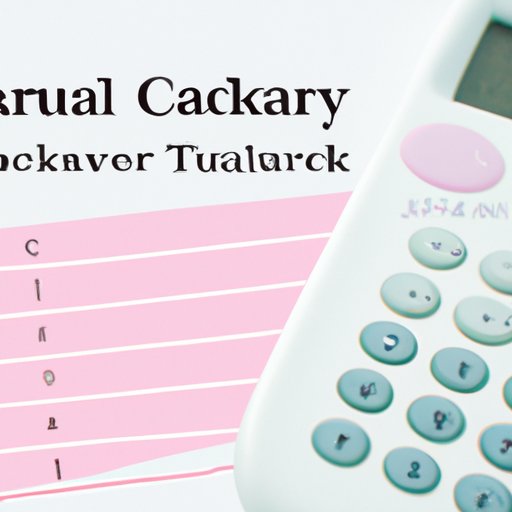
Introduction
If you’re trying to conceive, understanding ovulation is crucial. Knowing when you’re most fertile and likely to conceive can help you optimize your chances of pregnancy and plan accordingly. However, many women struggle to determine their fertile days accurately. With so much conflicting information, it can be hard to know where to begin.
This article is designed to help you unlock the secrets of ovulation. We’ll walk you through the process step-by-step and explore a variety of techniques to help you calculate your fertile days. Whether you’re just starting your conception journey or have been trying for a while, this guide will provide you with the insights you need to achieve success.
“Unlocking the Secrets of Ovulation: A Step-by-Step Guide to Calculate Your Fertile Days”
Before we dive into the details of ovulation calculation, it’s important to understand what ovulation is and how it works. Ovulation is the process by which your body releases an egg from your ovary, making it available for fertilization. This typically occurs once per menstrual cycle and is essential for conception.
To calculate ovulation, you need to identify your fertile days – the days during which you’re most likely to conceive. These days can vary based on your menstrual cycle length and how your body changes throughout the month.
The most common method to calculate fertile days is by tracking your menstrual cycle. This involves monitoring the length of your cycle and the duration of your period, as well as any signs of ovulation, such as cervical mucus changes and basal body temperature shifts.
Another approach is to use ovulation prediction kits, which help you identify your most fertile days by measuring hormone levels in your urine. These kits can help you pinpoint your fertile window more accurately and ensure that you have the best possible chance of conception.
Once you’ve identified your fertile days, it’s essential to maximize your chances of conception. This can include having sex during your fertile window, maintaining a healthy lifestyle, and reducing stress levels.
The Role of Hormones in Ovulation Calculation: Understanding Your Body’s Signals
Hormones play a vital role in ovulation and can be used to help identify your most fertile days. The two hormones primarily responsible for ovulation are luteinizing hormone (LH) and estradiol. These hormones cause changes in cervical mucus and increase basal body temperature, which can help you predict when ovulation is likely to occur.
These hormone signals can be monitored and tracked using a variety of methods. For example, LH can be detected using ovulation predictor kits, while changes in basal body temperature can be measured using a thermometer.
By monitoring your hormones, you can gain a better understanding of your body’s unique fertility patterns and ensure that you’re maximizing your chances of conception.
Fertility Apps: Your Digital Ovulation Calculator
Advances in technology have made it easier than ever to track and predict ovulation. Fertility apps are a popular choice for women looking to monitor their menstrual cycles and identify their most fertile days. These apps use data such as menstrual cycle length, basal body temperature, and cervical mucus changes to calculate your fertile window and provide personalized insights and advice.
While there are many benefits to using fertility apps, it’s crucial to choose a reliable and accurate option. Some apps may have limited functionality or rely on less reliable data, so it’s essential to do your research and select an app that suits your needs.
Getting Intimate with Your Fertility: Understanding How Sex Affects Ovulation
Sexual activity is essential for conception, but the timing and frequency of intercourse can impact your chances of conceiving. Having sex during your fertile window is crucial, as this increases the likelihood of the sperm reaching and fertilizing your egg.
It’s also important not to assume that more sex will automatically lead to pregnancy. Having sex too frequently or infrequently can reduce the chances of conception, so it’s essential to find the right balance and avoid common misconceptions about fertility and sexual activity.
By getting intimate with your fertility and understanding how sex affects ovulation, you can optimize your chances of pregnancy and plan your approach accordingly.
Alternative Methods for Calculating Ovulation:
Exploring Traditional and Holistic Approaches
While many women rely on standard tracking and testing methods to calculate ovulation, there are alternative techniques available that may be beneficial. Traditional methods such as acupuncture and herbal supplements can be used to help regulate hormones and promote fertility, while newer approaches such as astrological timing offer more unique insights into your body’s individual rhythms.
While these alternative methods may not be backed by robust scientific evidence, they can offer valuable insights and complement more conventional approaches to ovulation calculation.
The Beginner’s Guide to Ovulation: A Simple, Visual Explanation for Understanding Your Fertility
Understanding ovulation can be overwhelming, particularly for those new to the concept. That’s why we’ve included a simplified guide to ovulation that incorporates visual aids to help you grasp the fundamentals. From the role of hormones to tracking your menstrual cycle and identifying your most fertile days, this guide is designed to provide a low-stress introduction to ovulation calculation.
Once you’ve absorbed the basics, you can move on to more advanced techniques, such as tracking your hormones or using fertility apps, to further optimize your chances of pregnancy.
Conclusion
Calculating ovulation may seem daunting, but with the right resources and approach, it’s entirely manageable. By learning about the ovulation process, monitoring your hormones and menstrual cycle, and exploring alternative techniques, you can unlock the secrets of ovulation and maximize your chances of conception.
Remember that every woman’s body is unique, and what works for one person may not work for another. Be patient, stay positive, and don’t give up – you’ll get there eventually.




